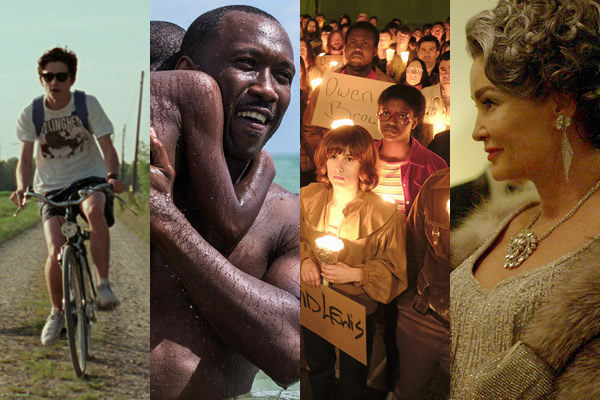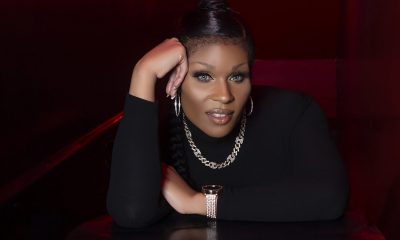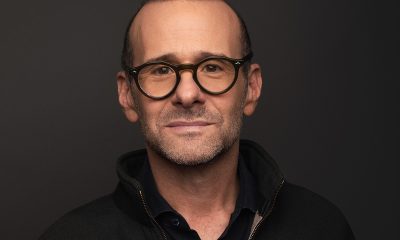a&e features
YEAR IN REVIEW: Top 10 pop culture stories of 2017
Epic Oscar mistake, Bette and Joan return in wild, wacky year
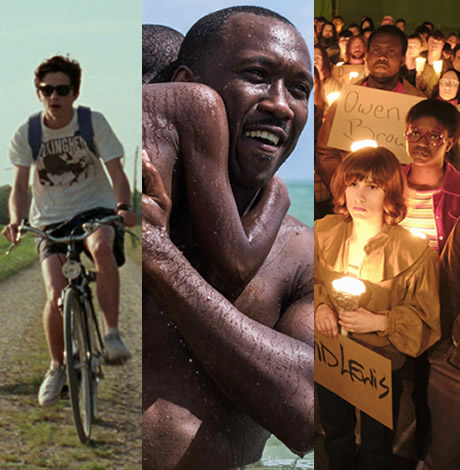
10. Aaron Carter comes out, gets busted for pot
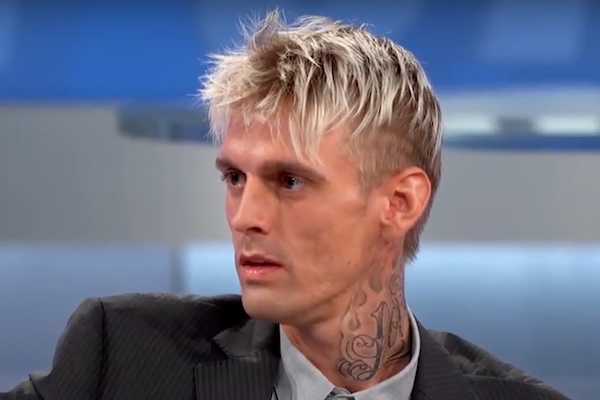
Aaron Carter
(Screenshot via YouTube)
Pop singer Aaron Carter, at the time 29 though he’s since turned 30, came out as bisexual in an open letter posted on Twitter in August.
“There’s something I’d like to say that I feel is important for myself and my identity that has been weighing on my chest for nearly half of my life,” Carter writes. “This doesn’t bring me shame, just a weight and burden I have held onto for a long time that I would like lifted off me.”
The star revealed he has been attracted to both genders since he was 13. He also shared that he had a sexual experience with another man when he was 17. Carter claimed that Madison Parker, his girlfriend at the time, broke up with him when he told her he was bisexual. Parker denied his sexuality was the reason for their spilt. He also said that his older brother Nick Carter had not reached out to him since he came out.
Carter brought his struggles with drug addiction, plastic surgery and his family on a tumultuous September episode of “The Doctors.” On the show, Carter learned he weighed only 115 pounds at 6 feet tall. He said he feared his weight loss was due to being HIV-positive. However, he tested negative for all STDs. His drug test revealed he tested positive for marijuana, Benzodiazepines (Xanax) and opiates (hydrocodone). After initially refusing to go to rehab on the show, Carter entered rehab in October and was released in December.
9. Milo Yiannopoulos goes down
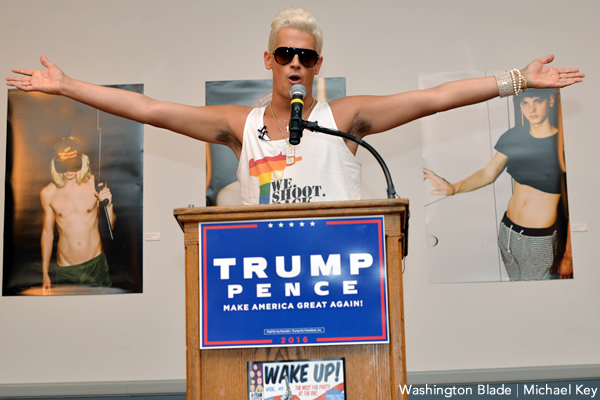
Milo Yiannopoulos (Washington Blade photo by Michael Key)
Milo Yiannopoulos’ swift descent from rising alt-right media personality to a defamed journalist shunned even from his own conservative community was peppered with controversy.
The year started out promisingly for the British political commentator who secured an autobiography book deal with Simon & Schuster and was invited as a guest on “Real Time with Bill Maher.” He kicked off a university speaking engagement tour which drew numerous protesters to University of California, Berkley. The protest became violent as protesters refused to let Yiannopoulos, who has made racist, misogynistic, transphobic and xenophobic remarks, to speak at the university. President Donald Trump even weighed in on Twitter threatening to cut the school’s federal funding for not allowing free speech.
Yiannopoulos’ success came to a halt when an old interview clip surfaced of him saying that sexual relationships between 13-year-old boys and adult men could be positive. His comments caused him to lose his job as senior editor for Breitbart News, to have his book deal with Simon & Schuster revoked and to be disinvited from the Conservative Political Action Conference.
Despite the negative press, Yiannopoulos tried to keep his career afloat. His publishing company Dangerous Books published his book “Dangerous.” Yiannopoulos closed out the year on a personal note marrying his boyfriend, identified only as “John,” in Hawaii.
8. ‘Call Me By Your Name,’ ‘Tom of Finland’ among year’s best films
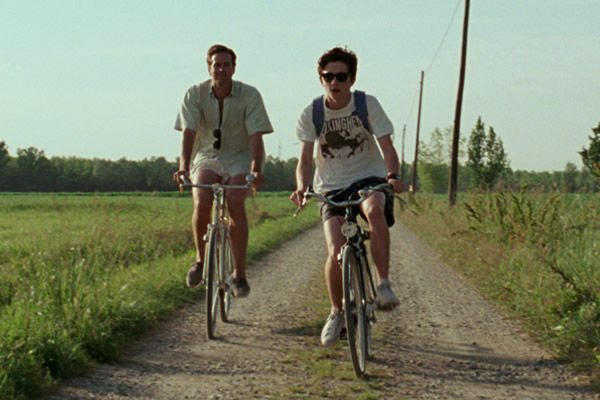
A scene from ‘Call Me By Your Name.’ (Photo courtesy Sony Pictures Classic)
It was a strong year for LGBT-themed movies but two especially stand out — “Tom of Finland” and “Call Me By Your Name.”
“Tom,” a Finnish biographical drama directed by Dome Karukoski, stars Pekka Strang as Touko Laakosenen, better known as the titular artist who specialized in mid-century homoerotic art. The film inspired a Tom of Finland renaissance of sorts with books and an extensive line of home products like shower curtains and throw pillows featuring Tom art.
“Call Me By Your Name,” a leisurely paced gay romance story between a 24-year-old intern (Armie Hammer) and the 17-year-old son of his employer (Timothee Chalamet) in Italy circa 1983, has drawn strong reviews for its taste and restraint.
“(Director Luca) Guadagnino and his actors emphasize tenderness and feeling capturing the magic of first-time dalliance in a way that makes it seem, if not wholly innocent, at least wholesome,” a Blade critic wrote.
It’s up for three Golden Globe Awards including nods for both its leads.
7. Season 9 of ‘RuPaul’s Drag Race’ makes ‘herstory’
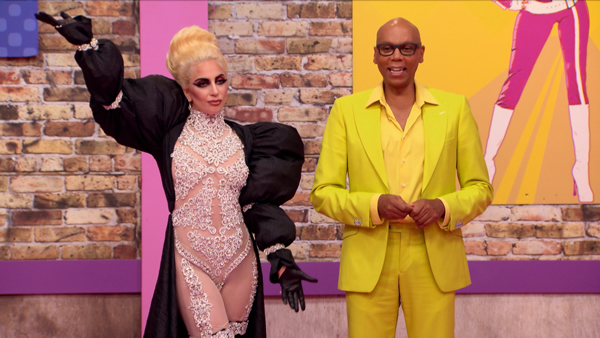
(Image courtesy VH1)
It was a banner year for “RuPaul’s Drag Race” in several ways. Debuting in March on new home VH1, the queens went apeshit when Lady Gaga walked into the work room and was featured as the guest judge.
Seeming to genuinely enjoy herself throughout the episode, Gaga helped series regulars Michelle Visage, Ross Matthews and Carson Kressley assess the queens’ interpretations of classic Gaga looks.
It turned out to be an unusually dramatic season, though. Latina diva Valentina emerged early on as a strong contender but was sent packing on episode nine after pissing off Ru for initially declining to remove a veil during the lip-sync against Debbie Downer Nina Bo’nina Brown. She said later she was in shock and hadn’t bothered to learn the words to the song, which all the queens are given in advance should they land in the bottom two.
The drama continued, though, on perhaps the bitchiest reunion episode of the series’ entire run with several queens calling out Valentina on her fake charm.
The finale, despite featuring no clear standout winner, went to Sasha Velour who bested Peppermint, Shea Coulee and Trinity Taylor for the title of America’s Next Drag Superstar.
RuPaul won his second consecutive Emmy Award for hosting.
6. ‘Wonder Woman’ lassos boffo box office
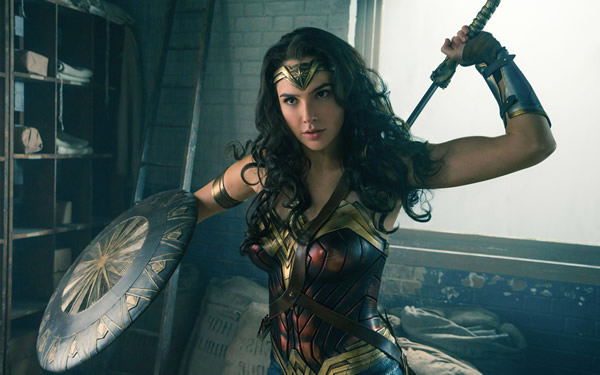
Gal Gadot (Photo courtesy Warner Bros. Pictures)
Although she’d been seen in 2016’s “Batman v. Superman: Dawn of Justice,” Wonder Woman finally got her own film this year with a June release starring Gal Gadot as the titular character and winningly helmed by Patty Jenkins (“Monster”) who won universal praise for her effort.
Filmed over a six-month period starting in November 2015 (development started in 1996), it set numerous box office records. It was the fifth highest-grossing superhero film in the U.S. and the 20th highest-grossing film ever stateside. It made more than $800 million internationally and is the best-ranked superhero film on Rotten Tomatoes. The American Film Institute called it one of the best 10 films of 2017.
Gadot plays the Amazon princess Diana, a highly trained fighter who’s been raised on the hidden island of Themyscira by her mother Queen Hippolyta (Connie Nielsen). The island’s security is breached when American pilot Steve Trevor (Chris Pine) crashes his plane on the island.
The Blade said it was “packed with gripping action sequences but also leavened with generous doses of comedy and deepened with serious considerations about the horrors of war and mankind’s capacity for both love and hatred.”
5. ‘Feud’ revives complicated partnership of Davis, Crawford
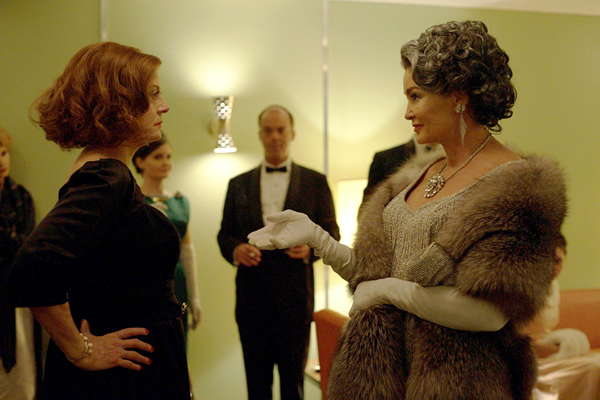
A scene from ‘Feud.’ (Photo courtesy Warner Bros. Pictures)
“Feud,” an FX series from Ryan Murphy, devoted its maiden season of eight episodes to the rivalry of Bette Davis and Joan Crawford, co-stars in the 1962 cult classic “Whatever Happened to Baby Jane.”
Jessica Lange starred as Crawford and Susan Sarandon played Davis. Both were nominated for Emmys, though the show won none of the 10 Primetime Emmys for which it was nominated (it won two Creative Arts Emmys). The series was praised for its period detail and grand, sweeping recreations of pivotal moments such as a long tracking shot showing Lange walking backstage at the 1963 Academy Awards.
Though declining somewhat in ratings after a strong start, the series fared decently overall. Its debut was the most-watched program on FX that week.
The series had an unexpected coda with Olivia de Havilland, a real-life friend of Davis who replaced Crawford in their planned follow-up “Baby Jane” movie “Hush … Hush Sweet Charlotte,” sued the creators claiming in a lawsuit filed a day before her 101st birthday that she was inaccurately portrayed and her likeness was used without her permission. Catherine Zeta-Jones played her in the series.
A second season of 10 episodes devoted to Charles and Diana will premiere in 2018.
4. ‘When We Rise’ draws mixed reviews
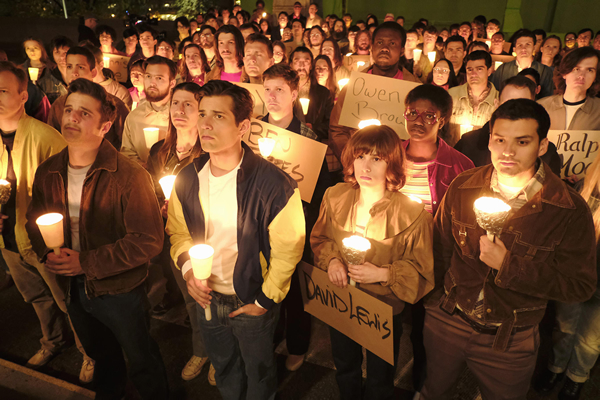
A scene from ‘When We Rise.’ (Photo courtesy ABC)
“When We Rise,” an ABC miniseries about LGBT rights that aired Feb. 27-March 3, drew so-so reviews from the mainstream press but was sharply criticized in the gay press.
Writing for the Blade, columnist Brock Thompson, said it had serious problems.
“Though I very much appreciate what ‘When We Rise’ was attempting, I couldn’t see past its problems,” Thompson said. “Its tone was preachy. Its messages about unity and strength in diversity landed like anvils. I stopped counting the clunky cliched lines like ‘we are stronger together,’ or ‘you don’t know how strong we are,’ or perhaps ‘strength. let’s get some and be strong with it together.’ All this gave way to some melodramatic moments. Beyond that, actors were switched out to play their role’s older counterparts, making the timeline rather confusing.”
Ratings, too, were weak for the series starring Guy Pearce, Mary Louise-Parker, Whoopi Goldberg and Rosie O’Donnell as Cleve Jones, Roma Pauline Guy, Pat Norman and Del Martin, respectively. Its first episode drew 3.26 million viewers to come in last of the four major networks for its time slot. Viewership dropped sharply thereafter. Scheduling was shifted after President Trump addressed Congress live on Feb. 28.
Helmed by multiple directors including writer Dustin Lance Black and Gus Van Sant, the eight-episode arc was framed as an epic, 45-year survey of the entire gay rights movement.
3. Chelsea Manning makes glam debut
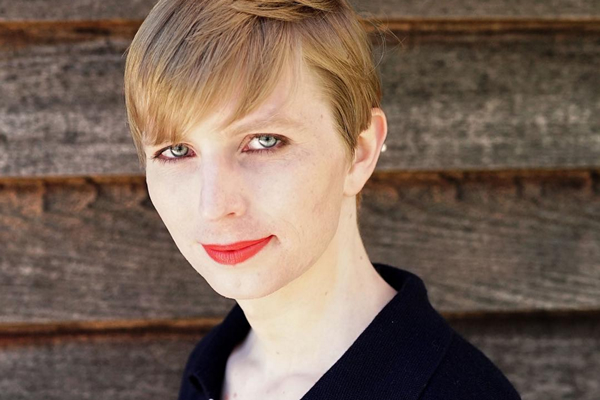
Chelsea Manning (Photo courtesy Instagram)
After being released from prison at Fort Leavenworth on May 17 after nearly seven years in prison for leaking 750,000 documents (some classified) to WikiLeaks, many were curious to see how Chelsea Manning would segue into civilian life.
Manning, 29, made her glam debut in the September issue of Vogue in a red Norma Kamall swimsuit and other high-fashion outfits with low-key styling by Phyllis Posnick and was praised for not being as sexualized and in-your-face as Caitlyn Jenner was when she made her debut in Vanity Fair in 2015.
“This is a far cry from the haughty, hyper-feminine Hollywood unveiling of Caitlyn Jenner,” wrote Robin Givhan in the Washington Post. She called Manning’s photos a “message of … accessibility, normalcy, calm.”
2. ‘Will & Grace’ and ‘Dynasty’ return
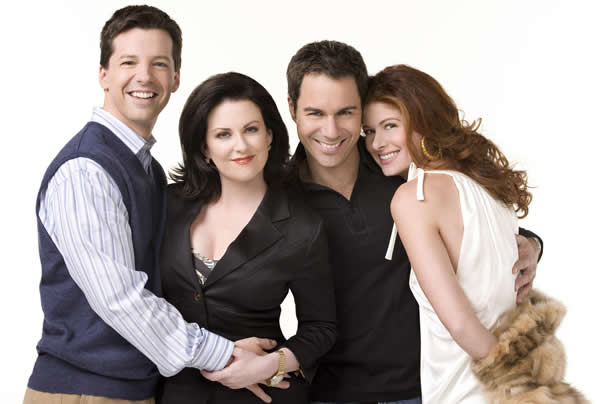
(Photo courtesy NBC)
After 11 years off the air, “Will & Grace” returned to NBC Thursday nights in September to launch a new, 16-episode run and ninth season.
The original cast — Eric McCormack, Debra Messing, Sean Hayes and Megan Mullally — were back after a planned one-off mini-episode that ran last fall timed to the presidential election.
The first new episodes of the show since 2006 found the familiar gang at the White House, navigating middle-aged gay dating, Jack discovering he’s a grandfather (with a gay grandson), Will making senior partner, an appearance by Beverley Leslie (Leslie Jordan) and many more hijinks.
Ratings have been solid — averaging more than 10 million viewers per episode — and reviews have been mostly positive.
A 10th season has already been approved.
Much less successful, however, has been the “Dynasty” reboot, which debuted in October on the CW with an all-new cast featuring James Mackay as Steven Carrington, Fallon’s (Elizabeth Gillies) gay environmentalist brother. Now his being gay is no big issue to dad Blake and gold digger Sammy Jo is now a gay man. Oh, and the Colbys are black this time.
Reviews have been highly mixed with Variety saying it “barely gets out of the gate before it begins to lose steam.” Ratings have been anemic, averaging less than a million viewers per episode.
1. ‘Moonlight’ wins Best Picture in shocking envelope mistake
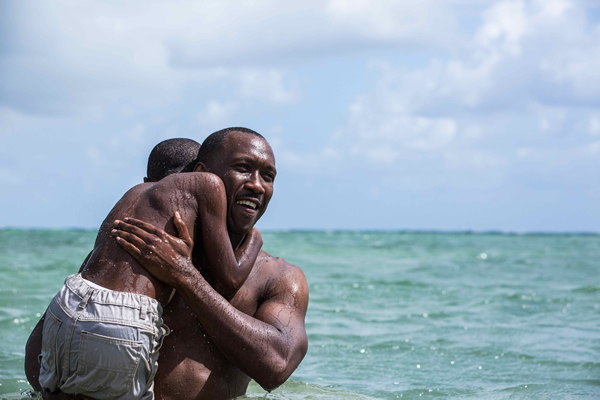
(Photo courtesy AMPAS)
It was supposed to be one of those nice little Oscar moments longtime fans of the Academy Awards cherish — beloved stars of yesteryear stride onstage reunited to give an award. Many stars have done it over the years — Jimmy Stewart and Kim Novak, Paul Newman and Elizabeth Taylor. This year it was Warren Beatty and Faye Dunaway, stars of 1967’s “Bonnie and Clyde.”
On the 50th anniversary of their cinematic classic, they came on stage at the Dolby Theatre on Feb. 26 to hand out the top prize of the evening. “La La Land” was announced as the winner but it quickly became apparent as its producers were giving their acceptance speeches that a mistake had been made and gay-themed “Moonlight” was the true winner.
Beatty and Dunaway had been handed the wrong envelope, a duplicate of the Best Actress envelope (“La La Land’s” Emma Stone had won that award). Upon seeing its contents, Beatty was flummoxed; Dunaway, thinking he was joshing for suspense, saw “La La Land” and announced it as the winner.
Dubbed the biggest gaffe in Oscar history, it turned out to be the mistake of PricewaterhouseCoopers’ managing partner Brian Cullinan who’d been Tweeting backstage. He and Martha Ruiz, who each had copies of the evening’s envelopes, were later relieved of any future Oscar duties though they kept their jobs.
“Moonlight” became the first LGBT-themed film and first film with an all-black cast to win Best Picture.
a&e features
Peppermint thrives in the spotlight
In exclusive interview, she talks Netflix show — and the need to resist Trump’s attacks

As an entertainer, there’s not much that Peppermint hasn’t done. She’s a singer, actor, songwriter, reality TV personality, drag queen, podcaster and the list goes on. Most importantly, as an activist she has been an invaluable role model for the trans, queer, and Black communities.
She’s a trailblazer who boasts an impressive list of ‘firsts.’ She is the first out trans contestant to be cast on “RuPaul’s Drag Race” (Season 9). She is the first trans woman to originate a principal musical role for Broadway’s “Head Over Heels.” She was also the first trans woman to compete in the runaway hit series “Traitors,” on Peacock, and she is the ACLU’s first-ever Artist Ambassador for Trans Justice. Her accolades are a true testament of the courage it took for Peppermint to live her authentic self.
We caught up with Peppermint to chat about her activism, taking on bigger roles on screen, our current political and social climate and life beyond the lens. For Peppermint, coming out as trans was not just a moment of strength—it was a necessity.
“It unfolded exactly as I had imagined it in terms of just feeling good and secure about who I am. I was in so much pain and sort of misery and anguish because I wasn’t able to live as free as I wanted to and that I knew that other people do when they just wake up. They get dressed, they walk out the door and they live their lives. Being able to live as your authentic self without fear of being persecuted by other people or by the government is essential to being healthy,” Peppermint tells the Blade in an exclusive interview.
“I was not able to imagine any other life. I remember saying to myself, ‘If I can’t imagine a life where I’m out and free and feeling secure and confident and left alone, then I don’t even want to imagine any kind of a life in the future,’” says Peppermint.
Recently, Peppermint returned for season 2 of Netflix’s comedy “Survival of the Thickest.” She added some spice and kick to the first season in her role as a drag bar owner. This time around, her character moves center stage, as her engagement and wedding become a major plot line in the show. Her expanded role and high-profile trans representation come at just the right time.
“It’s the largest acting role I’ve ever had in a television show, which my acting degree thanks me. It feels right on time, in a day where they’re rolling back trans rights and wanting to reduce DEI and make sure that we are limited from encouraging companies, corporations, industries, and institutions from not only featuring us, but supporting us, or even talking about us, or even referencing us.
“It feels great to have something that we can offer up as resistance. You can try to moralize, but it’s tougher to legislate art. So it feels like this is right on time and I’m just really grateful that they gave me a chance and that they gave my character a chance to tell a greater story.
Peppermint’s expanded role also accompanies a boom in queer representation in Black-powered media. Networks like BET and Starz and producers like Tyler Perry, are now regularly showcasing queer Black folks in main story lines. What does Peppermint think is fueling this increased inclusion?
“Queer folks are not new and queer Black folks are not new and Black folks know that. Every Black person knows at least one person who is queer. We are everywhere. We have not always been at the forefront in a lot of storytelling, that’s true, and that’s the part that’s new. It’s Hollywood taking us from the place where they usually have held us Black, queer folks in the makeup room, or as the prostitute, as an extra—not that there’s anything wrong with sex work or playing a background performer. I’ve played the best of the hookers! But those [roles] are very limiting.
“Hollywood has not historically done and still does not do a very good job of, including the voices of the stories that they make money [on]. And I think they’re realizing [the need] to be inclusive of our stories and our experiences, because for a long time it was just our stories without our actual experiences. It’s also exciting. It’s dramatic. It makes money. And they’re seeing that. So I think they’re just dipping their toes in. I think that they’re going to realize that balance means having us there in the room.”
Peppermint’s activism is tireless. She has raised more than six figures for prominent LGBTQ rights groups, she continues to speak around the nation, appears regularly on major media outlets addressing trans and LGBTQ issues and has been honored by GLAAD, World of Wonder, Out magazine, Variety, Condé Nast and more—all while appearing on screen and onstage in a long list of credits.
Now, under the Trump administration, she doesn’t have time to take a breath.
“I wouldn’t be able to do it if it weren’t second nature for me. Of course, there are ups and downs with being involved with any social issue or conversation and politics. But I am, for now, energized by it. It’s not like I’m energized by like, ‘Ooh, I just love this subject!’ right? It’s like, ‘Oh, we’re still being discriminated against, we gotta go and fight.’
“That’s just what it is. I get energy because I feel like we are quite literally fighting for our lives. I know that is hyperbole in some regards, but they are limiting access to things like housing, healthcare, job security and not having identification. Passport regulations are being put in a blender.”
Peppermint also mentions her thoughts on the unfair mandates to remove trans service members and revoke the rights and resources from the veterans who worked their whole lives to fight for this country.
“When you strip all these things away, it makes it really difficult for people to have a life and I know that that is what they’re doing. When I look around and see that that is what is at stake, I certainly feel like I’m fighting for my life. And that’s energizing.
“The only thing that would be the most rewarding besides waking up in a utopia and suddenly we’re all equal and we’re not discriminating against each other—which probably is not happening this year—is to be able to be involved in a project like this, where we can create that world. It’s also being built by people who are a part of that story in real life and care about it in real life.”
Peppermint is clear on her point that now is the time for all of the letters of the LGBTQ community to come together. Everyone who is trans and queer should be joining the fight against the issues that affect us all.
“Just trust us and understand that our experiences are tied together. That is how and why we are discriminated against in the way[s] that we are. The people who discriminate—just like how they can’t really distinguish between somebody who’s Dominican and somebody who’s African American — you’re Black when you’re getting pulled over. We are discriminated against in much the same way. It’s the same with being trans or queer or gender non-conforming or bi, we all have our own experiences and they should be honored.
“When laws are being created to harm us, we need to band together, because none of y’all asses is gonna be able to stop them from getting rid of marriage equality—which is next. If you roll the tape back to three years ago when somebody was trying to ask me about drag queen bans on readings in school, I was saying they’re coming for trans rights, which comes for bodily autonomy and abortion rights, which comes for gay marriage rights. Those three things will be wiped out.
Peppermint doesn’t take a pause to get fired up and call gay folk out in their obligation to return the favor to the Black trans community.
She shares with us her final thoughts.
“You cis-gender homosexuals need to stand the fuck up and understand that we are standing in front of you. It’s very difficult to understand this and know this, but so many of the rights that we have were hard fought and won by protest and by people fighting very hard for them. And many of those people in every single instance from the suffrage movement, obviously Civil Rights, queer rights, the AIDS and HIV movement—Black queer people have been there the entire time. Trans people have always been a part of that story, including Stonewall. Yes, we are using different terminology. Yes, we have different lenses to view things through, but let me tell you, if you allow us to be sacrificed before you see us go off the side, you will realize that your foot is shackled to our left foot. So, you better stand the fuck up!”
Peppermint for president!
a&e features
Tristan Schukraft on keeping queer spaces thriving
New owner of LA’s Abbey expands holdings to Fire Island, Mexico

LOS ANGELES — Like the chatter about Willy Wonka and his Chocolate Factory, the West Hollywood community here started to whisper about the man who was going to be taking over the world-famous Abbey, a landmark in Los Angeles’s queer nightlife scene. Rumors were put to rest when it was announced that entrepreneur Tristan Schukraft would be taking over the legacy created by Abbey founder David Cooley. All eyes are on him.
For those of us who were there for the re-opening of The Abbey, when the torch was officially passed, all qualms about the new regime went away as it was clear the club was in good hands and that the spirit behind the Abbey would forge on. Cher, Ricky Martin, Bianca del Rio, Jean Smart, and many other celebrities rubbed shoulders with veteran patrons, and the evening was magical and a throwback to the nightclub atmosphere pre-COVID.
The much-talked-about purchase of the Abbey was just the beginning for Schukraft. It was also announced that this business impresario was set to purchase the commercial district of Fire Island, as well as projects launching in Mexico and Puerto Rico. What was he up to? Tristan sat down with the Blade to chat about it all.
“We’re at a time right now when the last generation of LGBT entrepreneurs and founders are all in their 60s and they’re retiring. And if somebody doesn’t come in and buy these places, we’re going to lose our queer spaces.”
Tristan wasn’t looking for more projects, but he recounts what happened in Puerto Rico. The Atlantic Beach Hotel was the gay destination spot and the place to party on Sundays, facing the gay beach. A new owner came in and made it a straight hotel, effectively taking away a place of fellowship and history for the queer community. Thankfully, the property is gay again, now branded as the Tryst and part of Schukraft’s portfolio with locations in Puerto Vallarta and Fire Island.
“If that happens with the Abbey and West Hollywood, it’s like Bloomingdale’s in a mall. It’s kind of like a domino effect. So that’s really what it is all about for me at this point. It has become a passion project, and I think now more than ever, it’s really important.”
Tristan is fortifying spaces for the queer community at a time when the current administration is trying to silence the LGBTQ+ community. The timing is not lost on him.
“I thought my mission was important before, and in the last couple of months, it’s become even more important. I don’t know why there’s this effort to erase us from public life, but we’ve always been here. We’re going to continue to be here, and it brings even more energy and motivation for me to make sure the spaces that I have now and even additional venues are protected going in the future.”
The gay community is not always welcoming to fresh faces and new ideas. Schukraft’s takeover of the Abbey and Fire Island has not come without criticism. Who is this man, and how dare he create a monopoly? As Schukraft knows, there will always be mean girls ready to talk. In his eyes, if someone can come in and preserve and advance spaces for the queer community, why would we oppose that?
“I think the community should be really appreciative. We, as a community, now, more than ever, should stand together in solidarity and not pick each other apart.”
As far as the Abbey is concerned, Schukraft is excited about the changes to come. Being a perfectionist, he wants everything to be aligned, clean, and streamlined. There will be changes made to the DJ and dance booth, making way for a long list of celebrity pop-ups and performances. But his promise to the community is that it will continue to be the place to be, a place for the community to come together, for at least another 33 years.
“We’re going to build on the Abbey’s rich heritage as not only a place to go at night and party but a place to go in the afternoon and have lunch. That’s what David Cooley did that no others did before, is he brought the gay bar outside, and I love that.”
Even with talk of a possible decline in West Hollywood’s nightlife, Schukraft maintains that though the industry may have its challenges, especially since COVID, the Abbey and nightlife will continue to thrive and grow.
“I’m really encouraged by all the new ownership in [nightlife] because we need another generation to continue on. I’d be more concerned if everybody was still in their sixties and not letting go.”
In his opinion, apps like Grindr have not killed nightlife.
“Sometimes you like to order out, and sometimes you like to go out, and sometimes you like to order in, right? There’s nothing that really replaces that real human interaction, and more importantly, as we know, a lot of times our family is our friends, they’re our adopted family.
Sometimes you meet them online, but you really meet them going out to bars and meeting like-minded people. At the Abbey, every now and then, there’s that person who’s kind of building up that courage to go inside and has no wingman, doesn’t have any gay friends. So it’s really important that these spaces are fun, to eat, drink, and party. But they’re really important for the next generation to find their true identity and their new family.”
There has also been criticism that West Hollywood has become elitist and not accessible to everyone in the community. Schukraft believes otherwise. West Hollywood is a varied part of queer nightlife as a whole.
“West Hollywood used to be the only gay neighborhood, and now you’ve got Silver Lake and you’ve got parts of Downtown, which is really good because L.A., is a huge place. It’s nice to have different neighborhoods, and each offers its own flavor and personality.”
Staunch in his belief in his many projects, he is not afraid to talk about hot topics in the community, especially as they pertain to the Abbey. As anyone who goes to the Abbey on a busy night can attest to, the crowd is very diverse and inclusive. Some in the community have started to complain that gay bars are no longer for the gay community, but are succumbing to our straight visitors.
Schukraft explains: “We’re a victim of our own success. I think it’s great that we don’t need to hide in the dark shadows or in a hole-in-the-wall gay bar. I’m happy about the acceptance. I started Tryst Hotels, which is the first gay hotel. We’re not hetero-friendly, we’re not gay-friendly. We’re a gay hotel and everyone is welcome. I think as long as we don’t change our behavior or the environment in general at the Abbey, and if you want to party with us, the more than merrier.”
Schukraft’s message to the community?
“These are kind of dangerous times, right? The rights that we fought for are being taken away and are being challenged. We’re trying to be erased from public life. There could be mean girls, but we, as a community, need to stick together and unite, and make sure those protections and our identity aren’t erased. And even though you’re having a drink at a gay bar, and it seems insignificant, you’re supporting gay businesses and places for the next generation.”
a&e features
Creator Max Mutchnick on inspirations for ‘Mid-Century Modern’
Real-life friendships and loss inform plot of new Hulu show

It’s been a long time – maybe 25 years when “Will & Grace” debuted – since there’s been so much excitement about a new, queer sitcom premiering. “Mid-Century Modern,” which debuted on Hulu last week, is the creation of Max Mutchnick and David Kohan, the gay men who were also behind “Will & Grace.”
Set in Palm Springs, Calif., following the death of the one of their closest friends, three gay men gather to mourn. Swept up in the emotions of the moment, Bunny (Nathan Lane) suggests that Atlanta-based flight attendant Jerry (Matt Bomer) and New York-based fashion editor Arthur (Nathan Lee Graham) move into the mid-century modern home he shares with his mother Sybil (the late Linda Lavin). Over the course of the first season’s 10 episodes, hilarity ensues. That is, except for the episode in which they address Sybil’s passing. The three male leads are all fabulous, and the ensemble cast, including Pamela Adlon as Bunny’s sister Mindy, and the stellar line-up of guest stars, such as Jesse Tyler Ferguson, Vanessa Bayer, Richard Kind, and Cheri Oteri, keep humor buzzing. Shortly before the premiere of “Mid-Century Modern,” Mutchnick made time for an interview with the Blade.
BLADE: I’d like to begin by saying it’s always a delight to speak to a fellow Emerson College alum. In ways would you say that Emerson impacted your professional and creative life?
MAX MUTCHNICK: I think Emerson was the first place that reflected back to me that my voice, my thoughts were good, and they were worth listening to. I developed a confidence at Emerson that did not exist in my body and soul. It was a collection of a lot of things that took place in Boston, but I mean we can just put it all under the Emerson umbrella.
BLADE: Before “Will & Grace,” you co-created the NBC sitcom “Boston Common,” which starred fellow Emerson alum Anthony Clark. Is it important for you to maintain those kinds of alumni relationships?
MUTCHNICK: Because Emersonians are such scrappy little monkeys and they end up being everywhere in the world, you can’t help but work with someone from Emerson at some point in your career. I’m certainly more inclined to engage with someone from Emerson once I learn that they went to my alma mater. For me, it has much more to do with history and loyalty. I don’t think of myself as one of those guys that says, “Loyalty means a lot to me. I’m someone that really leans into history.” It’s just what my life and career turned out to be. The longer I worked with people and the more often I worked with them, the safer that I felt, which means that I was more creative and that’s the name of the game. I’ve got to be as comfortable as possible so I can be as creative as possible. If that means that a person from Emerson is in the room, so be it. (Costume designer) Lori Eskowitz would be the Emerson version. And then (writer and actor) Dan Bucatinsky would be another version. When I’m around them for a long time, that’s when the best stuff comes.
BLADE: Relationships are important. On that subject, your new Hulu sitcom “Mid-Century Modern” is about the longstanding friendship among three friends, Bunny (Nathan Lane), Jerry (Matt Bomer), and Arthur (Nathan Lee Graham). Do you have a friendship like the one shared by these three men?
MUTCHNICK: I’m absolutely engaged in a real version of what we’re projecting on the show. I have that in my life. I cannot say that I’m Jerry in any way, but the one thing that we do have in common is that in my group, I’m the young one. But I think that that’s very common in these families that we create. There’s usually a young one. Our culture is built on learning from our elders. I didn’t have a father growing up, so maybe that made me that much more inclined to seek out older, wiser, funnier, meaner friends. I mean the reason why you’re looking at a mouthful of straight, white teeth is because one of those old bitches sat across from me about 25 years ago at a diner and said, “Girl, your teeth are a disaster, and you need to get that fixed immediately.” What did I know? I was just a kid from Chicago with two nickels in my pocket. But I found three nickels and I went and had new teeth put in my head. But that came from one of my dearest in the group.
BLADE: Do you think that calling “Mid-Century Modern” a gay “Golden Girls” is a fair description?
MUTCHNICK: No. I think the gay “Golden Girls” was really just used as a tool to pitch the show quickly. We have an expression in town, which is “give me the elevator pitch,” because nobody has an attention span. The fastest way you can tell someone what David (Kohan) and I wanted to write, was to say, “It’s gay Golden Girls.” When you say that to somebody, then they say, “OK, sit down now, tell me more.” We did that and then we started to dive into the show and realized pretty quickly that it’s not the gay “Golden Girls.” No disrespect to the “Golden Girls.” It’s a masterpiece.
BLADE: “Mid-Century Modern” is set in Palm Springs. I’m based in Fort Lauderdale, a few blocks south of Wilton Manors, and I was wondering if that gay enclave was ever in consideration for the setting, or was it always going to be in Palm Springs?
MUTCHNICK: You just asked a really incredible question! Because, during COVID, Matt Bomer and I used to walk, because we live close by. We had a little walking group of a few gay gentlemen. On one of those walks, Matt proposed a comedy set in Wilton Manors. He said it would be great to title the show “Wilton Manors.” I will tell you that in the building blocks of what got us to “Mid-Century Modern,” Wilton Manors, and that suggestion from Matt Bomer on our COVID walks, was part of it.
BLADE: Is Sybil, played by the late Linda Lavin, modeled after a mother you know?
MUTCHNICK: Rhea Kohan (mother of David and Jenji). When we met with Linda for the first time over Zoom, when she was abroad, David and I explained to her that this was all based on Rhea Kohan. In fact, some of the lines that she (Sybil) speaks in the pilot are the words that Jenji Kohan spoke about her mother in her eulogy at the funeral because it really summed up what the character was all about. Yes, it’s very much based on someone.
BLADE: The Donny Osmond jokes in the second episode of “Mid-Century Modern” reminded me of the Barry Manilow “fanilows” on “Will & Grace.” Do you know if Donny is aware that he’s featured in the show?
MUTCHNICK: I don’t. To tell you the truth, the “fanilow” episode was written when I was not on the show. I was on a forced hiatus, thanks to Jeff Zucker. That was a show that I was not part of. We don’t really work that way. The Donny Osmond thing came more from Matt’s character being a Mormon, and also one of the writers. It’s very important to mention that the writing room at “Mid-Century Modern,” is (made up of) wonderful and diverse and colorful incredible humans – one of them is an old, white, Irish guy named Don Roos who’s brilliant…
BLADE: …he’s Dan Bucatinsky’s husband.
MUTCHNICK: Right! Dan is also part of the writing room. But I believe it was Don who had a thing for Donny, and that’s where it comes from. I don’t know if Donny has any awareness. The only thing I care about when we turn in an episode like that is I just want to hear from legal that we’re approved.
BLADE: “Mid-Century Modern” also includes opportunities for the singers in the cast. Linda Lavin sang the Jerome Kern/Ira Gershwin tune “Long Ago (And Far Away)” and Nathan Lane and the guys sang “He Had It Coming” from “Chicago.” Was it important to give them the chance to exercise those muscles?
MUTCHNICK: I don’t think it was. I think it really is just the managers’ choice. David Kohan and I like that kind of stuff, so we write that kind of stuff. But by no means was there an edict to write that. We know what our cast is capable of, and we will absolutely exploit that if we’re lucky enough to have a second season. I have a funky relationship with the song “Long Ago (And Far Away).” It doesn’t float my boat, but everybody else loved it. We run a meritocracy, and the best idea will out. That’s how that song ended up being in the show. I far prefer the recording of Linda singing “I’ll Be Seeing You” over her montage in episode eight, “Here’s To You, Mrs. Schneiderman.” We were just lucky that Linda had recorded that. That recording was something that she had done and sent to somebody during COVID because she was held up in her apartment. That’s what motivated her to make that video and send it. That’s how we were able to use that audio.
BLADE: Being on a streaming service like Hulu allows for characters to say things they might not get away with on network TV, including a foreskin joke, as well as Sybil’s propensity for cursing.
MUTCHNICK: And the third line in the show is about him looking like a “reluctant bottom.” I don’t think that’s something you’re going to see on ABC anytime soon. David and I liked the opportunity to open up the language of this show because it might possibly open the door to bringing people…I’m going to mix metaphors…into the tent that have never been there before. A generation that writes off a sitcom because that language and that type of comedy isn’t the way that they sound. One of the gifts of doing this show on Hulu is that we get to write dialogue that sounds a little bit more like you and I sound. As always, we don’t want to do anything just to do it.
BLADE: It didn’t feel that way.
MUTCHNICK: It’s there when it’s right. [Laughs] I want to have a shirt made with Linda’s line, as her mother always used to say, “Time is a cunt.”
BLADE: “Mid-Century Modern” also utilizes a lot of Jewish humor. How important is it for you to include that at this time when there is a measurable rise in anti-Semitism?
MUTCHNICK: I think it’s important, but I don’t think it’s the reason why we did it. We tried very hard to not write from a place of teaching or preaching. We really are just writing about the stuff that makes us laugh. One of the things that makes something better and something that you can invest in is if it’s more specific. We’re creating a character whose name is Bunny Schneiderman and his mother’s name is Sybil and they made their money in a family-run business, it gets Jewy, and we’re not going to shy away from it. But we’re definitely not going to address what’s going on in the world. That doesn’t mean I don’t find it very upsetting, but I’m writing always from the point of view of entertaining the largest number of people that I can every week.
BLADE: “Mid-Century Modern” has a fantastic roster of guest stars including Jesse Tyler Ferguson, Vanessa Bayer, Billie Lourd, Cheri Oteri, Richard Kind, Rhea Perlman, and Judd Hirsch. Are there plans to continue that in future seasons?
MUTCHNICK: Yes. As I keep saying, if we’re so lucky that we get to continue, I don’t want to do “The Love Boat.” Those are fine comic actors, so I don’t think it feels like that. But if we get to keep going, what I want to do is broaden the world because that gives us more to write about. I want to start to introduce characters that are auxiliary to the individuals. I want to start to meet Arthur’s family, so we can return to people. I want to introduce other neighbors, and different types of gay men because we come in so many different flavors. I think that we should do that only because I’m sure it’s what your life is and it’s what my life is. I’ve got a lot of different types. So, yes, we will be doing more.
BLADE: Finally, Linda Lavin passed away in December 2024, and in a later episode, the subject of her character Sybil’s passing is handled sensitively, including the humorous parts.
MUTCHNICK: We knew we had a tall order. We suffered an incredible loss in the middle of making this comedy. One of the reasons why I think this show works is because we are surrounded by a lot of really talented people. Jim Burrows and Ryan Murphy, to name two. Ryan played a very big role in telling us that it was important that we address this, that we address it immediately. That we show the world and the show goes on. That wasn’t my instinct because I was so inside the grief of losing a friend, because she really was. It wasn’t like one of those showbizzy-type relationships. And this is who she was, by the way, to everybody at the show. It was the way that we decided to go. Let’s write this now. Let’s not put this at the end of the season. Let’s not satellite her in. Let’s not “Darren Stevens” the character, which is something we would never do. The other thing that Jim Burrows made very clear to us was the import of the comedy. You have to write something that starts exactly in the place that these shows start. A set comedy piece that takes place in the kitchen. Because for David and me, as writers, we said we just want to tell the truth. That’s what we want to do with this episode and that’s the way that this will probably go best for us. The way that we’ve dealt with grief in our lives is with humor. That is the way that we framed writing this episode. We wanted it to be a chapter from our lives, and how we experience this loss and how we recover and move on.
-

 State Department5 days ago
State Department5 days agoHIV/AIDS activists protest at State Department, demand full PEPFAR funding restoration
-

 Brazil5 days ago
Brazil5 days agoUS lists transgender Brazilian congresswoman’s gender as ‘male’ on visa
-

 District of Columbia5 days ago
District of Columbia5 days agoCapital Pride wins $900,000 D.C. grant to support WorldPride
-

 Obituary4 days ago
Obituary4 days agoLocal attorney, LGBTQ rights advocate Dale Sanders dies at 75

